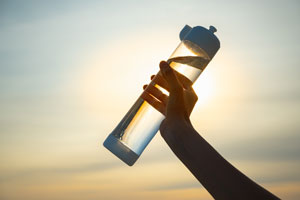 Every cell, tissue and organ in the human body contains water. Without water, your body can't maintain its temperature, get rid of waste or perform a host of other essential functions.
Every cell, tissue and organ in the human body contains water. Without water, your body can't maintain its temperature, get rid of waste or perform a host of other essential functions.
At the same time, you are constantly losing water—through urine, sweat and even your breath. And you lose more fluids than usual in hot weather, when exercising, while running a fever, or if you have diarrhea or are throwing up.
All of that means you need to take in water every day—and plenty of it.
When your body doesn't get the water it needs and there isn't enough fluid for proper circulation, you become dehydrated. And that can mean big problems. Severe dehydration can damage internal organs—such as the liver, kidneys and brain—and can even cause death.
Who's at risk?
Older adults are at high risk of dehydration because they may not easily sense when they are thirsty, or they may have a physical condition that makes it difficult to drink. Individuals with a chronic illness, like diabetes, or certain medical conditions, such as kidney stones or a bladder infection, are also at higher risk. In addition, some medications can increase the risk of dehydration.
Adults are also at increased risk if they:
• Exercise too hard or too long.
• Work or are otherwise physically active outdoors in hot weather.
• Are pregnant or breastfeeding.
Are you dehydrated?
Signs and symptoms of mild or moderate dehydration include:
• Thirst.
• Reduced sweating.
• Dry or sticky mouth.
• Light-headedness
• Small amounts of concentrated, dark yellow urine—or no urine at all.
• Dizziness.
• Muscle cramps.
People who are severely dehydrated may feel light-headed or confused, faint or have a hard, fast heartbeat.
Drinking a lot of water may be all that is needed to treat mild dehydration. More severe cases of dehydration require treatment with intravenous solutions that contain sodium chloride.
How to stay well-hydrated
To help prevent dehydration, drink plenty of fluids every day, especially when you are exercising (both during and after activity) and when the weather is hot. Choose water rather than sugary drinks. And carry a water bottle with you so you can sip on water as you go about your day.
You can vary your water intake with other fluids, such as flavored or sparkling water; herbal teas; juice; milk and its alternatives; and low-sodium broths. It's best to limit caffeine, but for most people, moderate amounts of plain coffee or black or green tea are safe. And eating water-rich fruits and vegetables, such as melons and tomatoes, can help you stay hydrated.
Sources: American Academy of Family Physicians; Centers for Disease Control and Prevention; National Institutes of Health; U.S. Department of Veterans Affairs